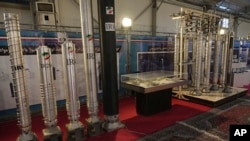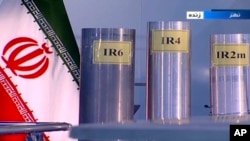
U.S. President Donald Trump on Friday appeared to signal that he is ready to take military action on Iran, unless the country agrees to a new deal that would restrain its rapidly advancing nuclear program.
“There'll be some interesting days ahead. That’s all I can tell you,” he told reporters in the Oval Office Friday.
Trump announced during a Fox Business News interview recorded Thursday night and aired Friday morning that he had sent a letter to Ali Khamenei, telling the Iranian supreme leader that it will be “a lot better for Iran” if they are willing to negotiate a nuclear deal.
“If we have to go in militarily, it’s going to be a terrible thing for them,” he said during the interview.
Trump said the U.S. is “down to final strokes with Iran,” and signaled he has his sights on the country’s “nice oil wells.”
“We have a situation with Iran that something's going to happen very soon, very, very soon,” he said. “I'm just saying I'd rather see a peace deal than the other, but the other will solve the problem.”
The deal Trump is referring to would replace the 2015 Iran nuclear deal, also known as the Joint Comprehensive Plan of Action on Iran. The JCPOA is a signature foreign policy achievement of his predecessor, former President Barack Obama. In 2018, during in his first term in office, Trump withdrew the U.S. from the deal.
Details of Trump’s new Iran deal are unclear. The White House has not responded to VOA’s request to provide the letter or further describe its contents.
The Permanent Mission of the Islamic Republic of Iran to the United Nations said there has been no confirmation from Khamenei’s office that any letter had been received.
“We have not received such a letter so far,” the mission said in a statement sent to VOA Friday.
Commenting on Trump’s letter, Stephane Dujarric, spokesperson for the United Nations secretary-general, said, “As a matter of principle, we reaffirm that diplomacy remains the best way to ensure the peaceful nature of Iran’s nuclear programme.
“In that regard, we welcome all diplomatic efforts towards that goal,” he said in a statement Friday.
Brinkmanship
Trump is engaging in a “classic case of brinkmanship,” said Farzin Nadimi, a senior fellow with The Washington Institute. “He's trying to raise the stakes with Iran, to compel its leadership to do deals with him.”
Early steps that Trump could take might include interdicting Iranian oil tankers to disrupt the country’s remaining lifeline amid crippling sanctions, but that could escalate the situation and trigger an Iranian tit-for-tat response, Nadimi told VOA.
“I don't think at this moment the U.S. government is thinking it wants to bomb Iranian oil installations,” he added. “Initially, I think every focus will be on Iranian air defenses, long-range missile capabilities and the nuclear sites.”
On Thursday, Israel's military said it performed a joint air force exercise with the U.S. this week involving Israeli F-15I and F-35I fighter jets flying alongside a U.S. B-52 bomber, in an apparent message to Iran. Israel said the exercise aims to practice “operational coordination between the two militaries to enhance their ability to address various regional threats.”
Trump campaigned on renewing “maximum pressure” on Iran, saying that his administration will not tolerate Iran obtaining a nuclear weapon or their support of terrorism in the Middle East and around the world. During his first term, Trump ordered the 2020 airstrike that killed Iran's most powerful military commander, Qassem Soleimani.
However, it’s unclear why he is ramping up pressure on Tehran now, amid other rapid developments on Washington’s positions in various conflicts, including the wars in Gaza and Ukraine, said Seth Jones, president of the Defense and Security Department at the Center for Strategic and International Studies.
“This was bound to be a much more aggressive policy than what we've seen,” Jones told VOA. “But I don't know if there's a clear strategy going forward.”
No negotiations under sanctions
Iran’s Foreign Minister Abbas Araghchi dismissed the prospect of nuclear negotiations with the U.S. while Tehran remains under heavy sanctions from Washington.
“We will not enter any direct negotiations with the U.S. so long as they continue their maximum pressure policy and their threats,” Araghchi said in an interview with AFP on Friday. He added that Tehran is speaking with “three European countries,” along with “Russia and China, [and] other members of the JCPOA.”
Trump has spoken more broadly about his desire to eliminate their nuclear weapons, signaling he wants to negotiate denuclearization efforts with China and Russia as well.
“It would great if everybody would get rid of their nuclear weapons,” he told reporters in the Oval Office Thursday.
VOA's Michael Lipin and Margaret Besheer contributed to this report.







